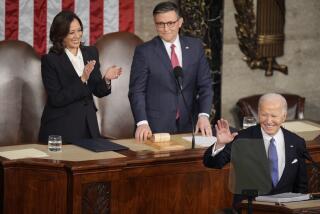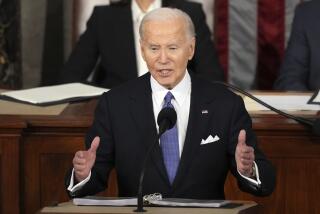Bush cites history in retooled Iraq message
With just three weeks to go before a crucial progress report on Iraq, the White House has launched a new communications effort to frame the debate by casting the war in historical terms.
The opening event was a speech Wednesday by President Bush to the Veterans of Foreign Wars annual convention, in which he argued that the history of American action in Asia -- particularly in Vietnam and Japan -- holds lessons for the current conflict.
Bush plans to follow up with an address Tuesday to the American Legion in Reno, in which he is expected to discuss the Iraq war in the context of the Middle East.
The message, the president and his advisors say, is: Just as the United States succeeded in bringing democracy and prosperity to Asia, it can do the same in Iraq.
“The advance of freedom in these lands should give us confidence that the hard work we are doing in the Middle East can have the same results we’ve seen in Asia and elsewhere, if we show the same perseverance and the same sense of purpose,” the president said Wednesday.
The speech was essentially a repackaging of themes Bush long has articulated: The outcome of the Iraq war is crucial to the future security of the United States, and it would dishonor U.S. servicemen and women to withdraw -- as many Democrats and some Republicans want.
“As they take the initiative from the enemy, they have a question: Will their elected leaders in Washington pull the rug out from under them just as they’re gaining momentum and changing the dynamic on the ground in Iraq?” Bush said. “My answer is clear: We’ll support our troops, we’ll support our commanders, and we will give them everything they need to succeed.”
The newest element in the president’s communications strategy was a willingness to discuss Vietnam, a conflict that critics of the Iraq war often cite to suggest that the United States should cut its losses in Iraq and begin withdrawing.
Bush has been skittish in the past about analogies to the Vietnam War, largely because of the negative connotations it continues to hold for many Americans.
“One unmistakable legacy of Vietnam is that the price of America’s withdrawal was paid by millions of innocent citizens whose agonies would add to our vocabulary new terms like ‘boat people,’ ‘re-education camps’ and ‘killing fields,’ ” Bush said.
Aides said the president felt it was necessary to revamp his message in the weeks before Army Gen. David H. Petraeus delivers a progress report that Congress mandated.
White House counselor Ed Gillespie and Deputy Chief of Staff Karl Rove worked with the president on the speech. There was a sense in the White House that the president’s rhetoric on Iraq, though consistent, was also becoming somewhat repetitive.
“The repetition is necessary and by design,” White House communications director Kevin Sullivan said in an interview, adding that the language is usually fresh to every new audience. “However, the president was aware of wanting to set the table for the upcoming report and the discussion that will follow it in a new way that was both compelling and illustrative. We’ve done this work before, and it was beneficial to the American people.”
Both speeches were planned for veterans groups, guaranteeing that audiences would respond enthusiastically to the president’s calls to support the troops. On Wednesday, VFW members repeatedly interrupted Bush’s speech with applause and standing ovations.
A former official who left the White House recently said the new communications strategy was based on two arguments the administration has been making for a long time.
“One, we can win. And in past cases, such as Korea or Japan, people who made confident predictions about the impossibility of succeeding were eventually proven wrong. Two, the consequences of failure are so bad we should be willing to pay a price to win,” the official said, speaking on condition of anonymity because he is no longer permitted to speak for the administration.
What’s different, the official said, is that the president is taking a perceived weakness -- historical comparisons to Vietnam -- and turning it into a strength.
“Vietnam has been wrung around the administration’s neck on Iraq for a long time,” he said. “There are many analogies or comparisons or connections that could cut against the administration’s position, but this is a connection that supports the administration’s position. . . . They want to say, the last time you took a drastic option like abandoning our allies it didn’t work well. Let’s take a more measured one. They’re setting that up.”
A secondary communications effort got underway from a different quarter of the Republican Party on Wednesday, as nonprofit group Freedom’s Watch launched a $15-million television ad campaign to support the administration’s position on Iraq.
The group, headed by two former Bush administration officials -- Bradley Blakeman, a former senior assistant to Bush, and Ari Fleischer, Bush’s former spokesman -- is funded by private donations.
“Those who want to quit while victory is possible have dominated the public debate about terror and Iraq since the 2004 election. Freedom’s Watch is going to change that,” Blakeman said in a statement.
The group did not specify which members of Congress would be targeted by the ads, and Blakeman and Fleischer did not respond to calls seeking comment. But antiwar groups said 90% of the group’s targets were Republicans, mostly moderates and mavericks who have expressed doubts about the course of the war.
“There are 41 politicians covered by their buys, and 37 of them are Republicans,” said Tom Matzzie, Washington director of MoveOn.org and campaign director for Americans Against Escalation in Iraq.
“Their theory is that they are providing support” for those Republicans, Matzzie said, but he believed the ads would backfire: “More Iraq on TV is bad news for Republicans in Congress. All people are going to see is more people hurt by the war.”
--
james.gerstenzang@latimes.com
Reynolds reported from Washington and Gerstenzang reported from Kansas City. Times staff writer Doyle McManus contributed to this report.
More to Read
Get the L.A. Times Politics newsletter
Deeply reported insights into legislation, politics and policy from Sacramento, Washington and beyond. In your inbox three times per week.
You may occasionally receive promotional content from the Los Angeles Times.






